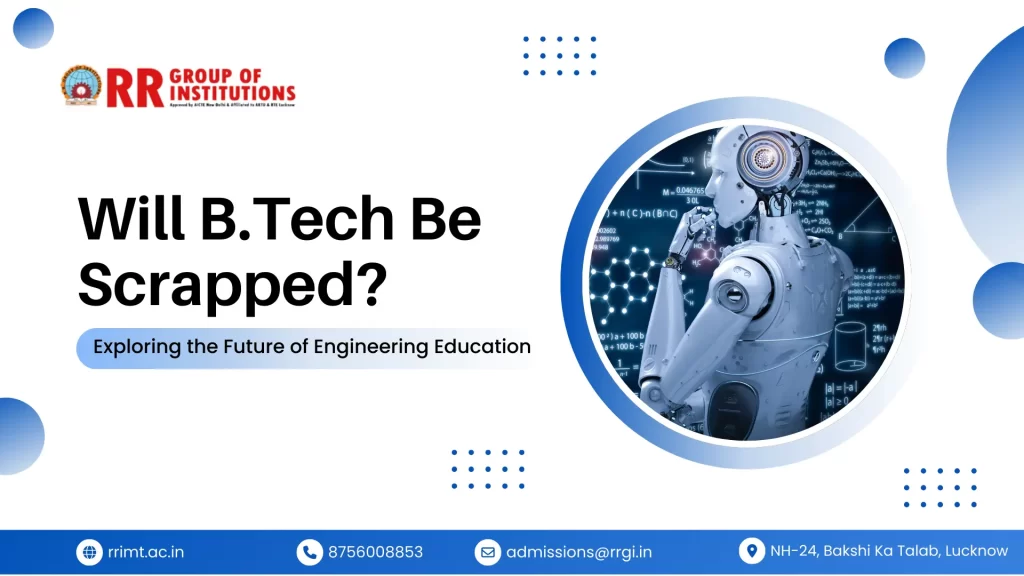
Will BTech Be Scrapped?
Academic and business circles have been debating “Will BTech be scrapped?” whether the Bachelor of Technology (B.Tech) degree might be eliminated. Traditional engineering degrees have become less relevant as firms seek fresh expertise and technology develops. However, as industries evolve and new technologies emerge, questions arise: Will BTech be scrapped to make way for more specialized, skills-based education?
The Best BTech College in Lucknow R.R. Group of Institutions (RRGI) will investigate the possibility of such a relocation, the elements influencing this argument, and what this suggests for the direction of work and education.
Why Is This Question Arising?:
Changing Industry Requirements
- The emergence of artificial intelligence, data science, and blockchain has generated a need for specific knowledge not generally addressed in conventional engineering courses.
- Many businesses these days give practical skills and certifications more priority over official degrees. This has led many to wonder: Will BTech be scrapped, or will it adapt to these new needs?
Different approaches to education
- Faster, more focused skill acquisition comes from boot camps, online courses, and certificates.
- Students can study particular technologies via sites as Coursera, Udemy, and edX without spending the time and money required of a 4-year degree.
Policy debates
- Uncertainty has been stoked by speculations on changes in educational systems, including the elimination or alteration of several degree programs.
Arguments for and against: Will BTech be scrapped?
Arguments For Scrapping
- Arguments for a revised outdated curriculum Many B.Tech initiatives are attacked for not matching industry expectations.
- Economicality: More reasonably priced and usually yielding faster outcomes are alternative learning paths.
- Skill-Oriented Focus: Employers regard practical abilities more highly than degrees.
Argument Against Scrapping
- Foundation Knowledge: Strong theoretical and practical basis is given by B.Tech programs.
- Professional Recognition: Engineers all around still set their standards from this degree.
- Accreditation and Quality Assurance: Degrees guarantee graduates’ consistent knowledge and skills, therefore supporting accuracy and quality assurance.
In substitute of B.Tech what could?
| Alternative Model | Description | Pros | Cons |
| Micro-Credentials | Short-term courses focusing on specific skills | Cost-effective, quick to complete | Limited recognition compared to full degrees |
| Integrated Work-Learn Programs | Programs combining academic study with internships | Industry-ready graduates, hands-on learning | May lack depth in foundational knowledge |
| Specialized Degrees | Degrees tailored to new-age technologies (e.g., AI, ML) | Direct alignment with industry needs | Limited flexibility for broader career options |
The Future of Engineering Education
The B.Tech degree might change to better fit contemporary needs instead of being thrown out. These are some possible modifications:
- Universities might add courses in artificial intelligence, IoT, and sustainability to help degrees be more relevant.
- Hybrid Learning Models: One could see a mix of online certifications and conventional classes.
- Enhanced Industry Cooperation: Industry-specific alliances could help programs to be more vibrant and useful.
Important Learning Points
- Though it is improbable to be completely deleted, the B.Tech degree could undergo major changes.
- Industry cooperation and skill-oriented learning paths will help to define engineering education going forward.
- To remain competitive in changing employment environments, students should emphasize lifetime learning.
What Can Students Do?
- Change with the times: Keep learning about new chances and improvements in education.
- Skill Up:Invest in certificates and seminars on developing technology to improve your skills.
- Focus on Practical Knowledge: Emphasize practical knowledge by looking for projects, internships, and real-world implementations of what you have learned.
Conclusion: Will BTech Be Scrapped?
For decades, engineering education has revolved mostly around the B.Tech degree. Although it might change to fit the demands of a fast changing environment, for many ambitious engineers it is still a useful certification. Students who embrace both conventional and modern learning approaches will be ready for a time when basic information will be balanced with innovative skills.
What are your thoughts? Do you believe BTech will be scrapped, or will it adapt to the needs of the future?
FAQs: Will BTech Be Scrapped?
1. Exists another degree beyond a B.Tech one?
Options include certificates in specialty technology, diploma courses, and vocational training.
2. Does the market for engineers show any fall?
Not totally; demand is moving to specialized disciplines including artificial intelligence, robotics, and sustainable technology.
3. How may B.Tech be more relevant?
Including industrial cooperation, practical instruction, and new technologies into the course of study.
4. Will B.Tech’s abolition effect India’s world competitiveness?
Extreme reforms could compromise India’s standing as a center of engineering expertise.
5. In this doubtful situation, what actions should students follow?
Pay attention to industry developments and concentrate on developing in-demand skill set.

